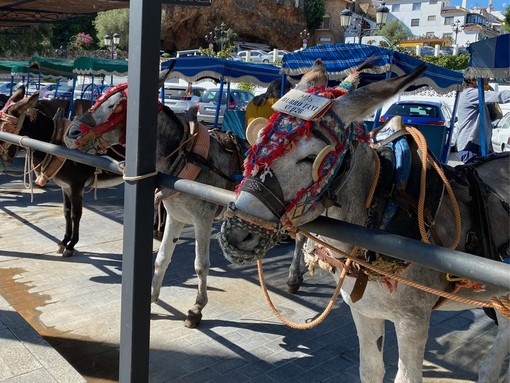
Improving the welfare of working donkeys
Regardless of the context, animal welfare must always be the top priority. That is why we are committed to improving conditions for working donkeys and mules and advocating for responsible practices in the tourism industry.
Our work in Mijas: improving welfare standards
For many years, we have collaborated with Mijas Town Hall and local donkey owners to enhance the welfare of working donkeys. Our efforts have focused on:
- Improving conditions both during work and rest periods
- We are available to the town hall to conduct health and welfare assessments for each of these animals through our expert veterinary team
- Establishing and enforcing weight limits for donkey taxis
- Advocating for stronger regulations and penalties for non-compliance.
Thanks to these efforts, current regulations now have legal status, meaning violations can lead to sanctions, including the loss of a license to provide donkey taxi services.
Additionally, we are actively involved in a working group under the EU Platform on Animal Welfare (Eurogroup for Animals), where we are helping develop guidelines for donkey owners, regulators, and tourists to ensure better treatment of equines in tourism.
Tourists have the power to make a difference
If you are considering using donkey-related tourism services, we encourage you to ask yourself, “Would I be comfortable working under these same conditions?”.
Consumers have the power to drive positive change. By choosing ethical tourism and speaking out against mistreatment, you can help improve the lives of working donkeys and mules.
In collaboration with other equine welfare organizations, we have created this brochure to guide consumers in making informed and responsible choices before embarking on a ride or carriage drive.
How to report concerns
If you witness a donkey or mule being mistreated in a tourism setting, we strongly recommend reporting it to the local authorities. In Mijas, concerns should be directed to the Concejalía de Transporte y Movilidad (Transport and Mobility Department). When filing a complaint, please include:
- The donkey taxi’s license number (found on the front of the donkey or the back of the cart)
- A description of the donkey and owner
- Any relevant photos or videos (as these provide stronger evidence).
Where to report
Ayuntamiento de Mijas (Mijas Town Hall)
Avenida Virgen de la Peña 2, 29650 Mijas (Málaga, Spain)
(+34) 952 48 59 00
atencionciudadana@mijas.es | transportes@mijas.es | alcaldia@mijas.es
Get in touch
We hope this information provides insight into our ongoing efforts to improve donkey welfare in tourism. If you have further questions or concerns, please don’t hesitate to contact us. Together, we can create a more compassionate future for donkeys and mules worldwide.
Share this page
Tags
- Blog

